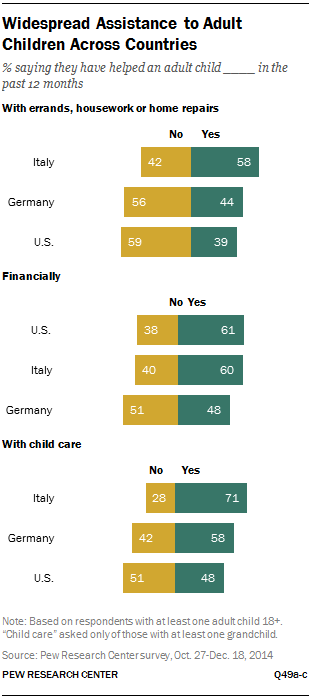
Family support goes in different directions and ebbs and flows at different stages of life. This section explores the support and assistance parents give to their adult children. The survey finds that, in all three countries, parents are providing a fair amount of help to their adult children. Many in the U.S., Italy and Germany have provided financial assistance, either for special circumstances or for recurring expenses; helped with errands, housework or home repairs; and provided child care in the 12 months prior to the survey. And about a quarter or more – including nearly half of Italians – say an adult child is living in their home most of the year.
Vast majorities of parents with adult children across the three countries surveyed say helping an adult child is rewarding; at least eight-in-ten in each of the countries feel this way. In contrast, relatively few say it is stressful, with Americans (30%) more likely than Germans (15%) and Italians (12%) to say this is the case.
Helping Adult Children with Errands, Finances and Child Care
Among parents with adult children, about six-in-ten in the U.S. (61%) and Italy (60%), and about half in Germany (48%) say they have helped an adult child financially in the preceding 12 months.
In Italy, more than half have also helped their adult children with errands, housework or home repairs (58%) and, among those who have grandchildren, with child care (71%); 58% of German grandparents have also helped their children with child care in the preceding 12 months. Americans are less likely than Italians to say they have helped their adult children with child care (48%) and with errands, housework or home repairs (39%). Americans are also somewhat less likely than Germans to say they have helped their children with these tasks, but the gap is not as pronounced as the gap between American and Italian parents.
Financial support for adult children may be contingent, at least in part, on parents’ own financial well-being. In the three countries surveyed, about seven-in-ten parents with higher household incomes say they have given financial assistance to an adult child (73% in the U.S., 72% in Italy, and 71% in Germany). In contrast, among parents with lower incomes, 55% in the U.S., 52% in Italy and 40% in Germany have helped an adult child financially in the preceding 12 months.
In Germany and the U.S., those with higher incomes are also more likely than those with lower incomes to say they have helped an adult child with child care and with errands, housework or home repairs. About three-quarters (76%) of German grandparents and 58% of American grandparents with higher incomes say they cared for at least one grandchild in the preceding 12 months, compared with 51% of those with lower incomes in Germany and 44% in the U.S. And while about half of those with higher incomes in Germany (53%) and the U.S. (49%) helped an adult child with errands, housework or home repairs, 38% and 33%, respectively, among those with lower incomes did so. In contrast, Italian parents in each income group report similar rates of help for an adult child with errands and child care.
Recurring Expenses vs. Special Circumstances
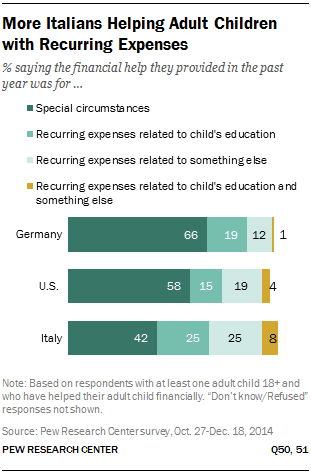
About two-thirds of German parents and 58% of American parents who have provided financial help to an adult child in the preceding 12 months say the help was for special circumstances. In Germany, an additional 19% say the assistance was for recurring expenses related to the child’s education, and 12% say it was for recurring expenses related to something else. In the U.S., about as many say the help was for education-related recurring expenses (15%) as say it was for recurring expenses related to something other than their child’s education (19%).
In contrast, 42% of Italian parents who have helped an adult child financially in the preceding 12 months say the money was for special circumstances. An equal share say the assistance was for recurring expenses related to an adult child’s education as say it was for recurring expenses related to something else (25% each), and 8% say it was for recurring expenses related to both a child’s education and something else.
In all three countries, parents with higher household incomes are more likely than those with lower incomes to say they provided help with recurring expenses related to an adult child’s education. For example, 33% of Italian parents with higher incomes who say they helped an adult child financially in the preceding 12 months say the assistance was for a recurring education-related expense, compared with 18% of those with lower incomes. Significant differences are also evident in Germany (24% vs. 13%) and in the U.S. (20% vs. 12%).
Regular Childcare vs. Occasional Babysitting
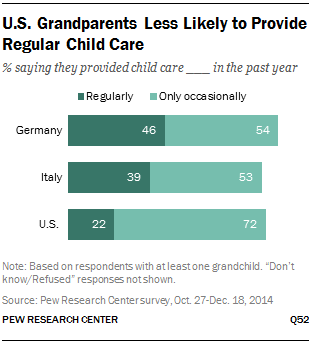
German and Italian grandparents who say they have cared for a grandchild in the previous 12 months are more likely than their American counterparts to say they helped their adult children with regular child care. About four-in-ten or more in Germany (46%) and Italy (39%) say they provided regular child care, compared with about one-in five (22%) in the U.S.
About seven-in-ten (72%) American grandparents who say they have cared for a grandchild in the preceding 12 months say they have provided only occasional babysitting; 54% in in Germany and 53% in Italy say the same.
Living Arrangements
Nearly half of Italians (47%) say an adult child is living with them in their home. That is far more than in the U.S. (28%) or Germany (23%).
Italians ages 50 to 64 who have adult children are particularly likely to say at least one lives with them most of the year; 60% say this is the case, compared with 30% of their American and 27% of their German counterparts.15
Helping Adult Children Seen As Rewarding
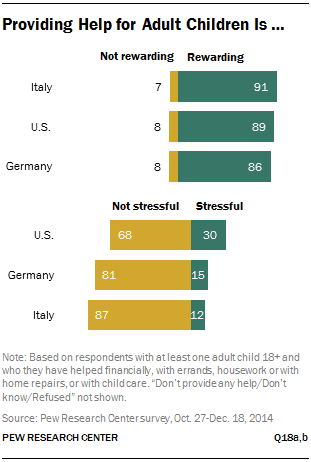
Similar to views about helping aging parents, most parents in the three countries surveyed are comfortable with the level of support they are providing their adult children. Italians (80%), Germans (75%) and Americans (72%) feel that they are expected to do about the right amount for an adult child. In the U.S., about three times as many say they are expected to do too much (14%) as say they are expected to do too little (5%) for an adult child, while in Italy and Germany less than one-in-ten give each of these responses.
Among those who have helped an adult child financially, with errands, housework or home repairs, or with child care, large majorities in the three countries say helping an adult child is rewarding. At least eight-in-ten in Italy (91%), the U.S. (89%) and Germany (86%) say this is the case, including about six-in-ten in Italy (58%) and the U.S. (56%) and 45% in Germany who say it is very rewarding.
In contrast, relatively few say providing help for their adult children is stressful. Three-in-ten Americans who have helped their adult children in some way say this is stressful, as do even fewer in Germany (15%) and Italy (12%).
What Adult Children Say
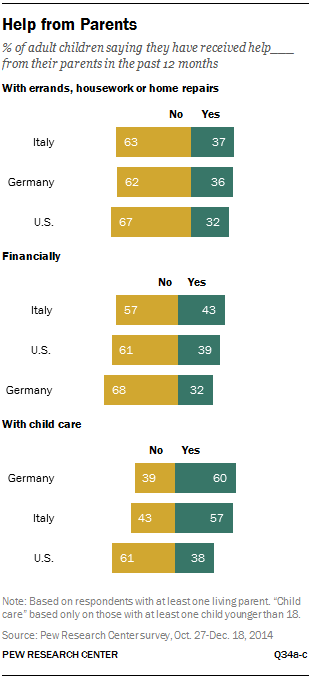
The share of parents who say they are helping out an adult child does not necessarily square with the share of adult children who say they are receiving assistance from a parent. For example, while about six-in-ten parents in the U.S. and Italy and about half in Germany say they have provided financial support to an adult child in the 12 months prior to the survey, only about four-in-ten adult children in Italy (43%) and the U.S. (39%) and 32% in Germany say a parent helped them financially over that period. Less than half also said a parent helped them with errands, housework or home repairs (37% in Italy, 36% in Germany, and 32% in the U.S.), even though larger shares of parents in each country report providing this type of help.
Various factors may help to explain the differences between the two generations. For example, social desirability may play a role, as some parents may be inclined to say they have helped their adult children, while the children may be inclined to say they did not receive any help. In addition, the two generations may have different definitions of what counts as financial help or what counts as errands, housework or child care.16
Among adults with at least one child younger than 18, majorities in Germany (60%) and Italy (57%) say their parents helped them with child care in the previous 12 months, but just 38% in the U.S. say the same. And among those who say their parents have provided child care, 81% in the U.S., 65% in Germany, and 59% in Italy say their parents babysat for their children occasionally rather than providing regular child care.
In the three countries surveyed, young adults are among the most likely to say they have received financial help from a parent. About eight-in-ten (81%) Italian adults younger than 30 say this has happened in the preceding 12 months, as do 65% of Americans and 60% of Germans in the same age group. In contrast, four-in-ten, or fewer older adults in each of the three countries, say a parent has helped them financially.
Of those who have received parental financial help, 18% in Germany, 16% in the U.S., and 14% in Italy say it was for a recurring expense related to their education, while 15%, 19%, and 25%, respectively, say it was for a recurring expense related to something else. About six-in-ten of those who received parental financial help in the preceding 12 months in Germany (63%) and the U.S. (60%) and about half (51%) in Italy say the assistance was given for special circumstances.
Younger adults are also more likely to say their parents have helped them with errands, housework or home repairs. About six-in-ten (58%) Germans ages 18 to 29 say they received this type of parental help in the preceding 12 months, as do about half of Italians (53%) and Americans (50%). Far fewer among those ages 30 to 49 and 50 to 64 say a parent has helped them with errands, housework or home repairs; there are double-digit difference between younger respondents and those in each of the other two age groups on this question in all three countries (there are too few adults ages 65 and older with a living parent to analyze).
Overall, two-thirds or more of adults in Germany (76%), the U.S. (72%) and Italy (68%) say they get as much help as they need from their parents.




